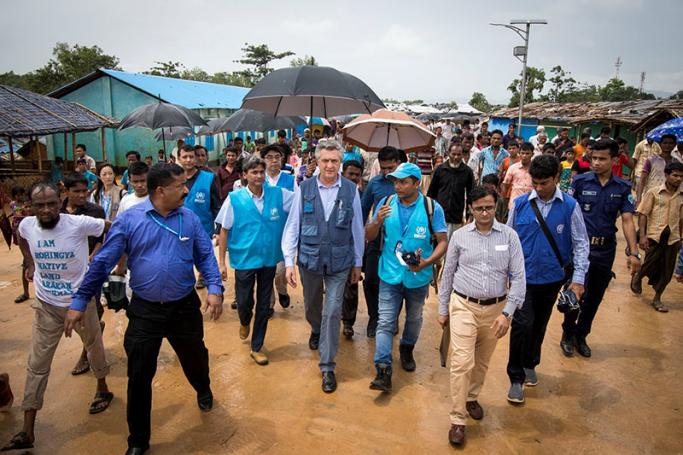Dhaka, Bangladesh – The UN refugee agency has urged the leaders of Bangladesh and Myanmar to secure the future of the younger generation of the Rohingya refugees through resolving the problem as soon as possible.
The United Nations High Commissioner for Refugees (UNHCR) Fillippo Grandi made the appeal at a press conference held in the capital Dhaka on Monday evening at the conclusion of his 10-day visit to Myanmar, Thailand and Bangladesh.
The UNHCR chief also called upon the international community to continue their support to Bangladesh over Rohingya refugees with resource mobilisation saying the solution to the problem lies with Myanmar.
Mr. Grandi put emphasis on implementation of the Myanmar citizenship verification process “efficiently and rapidly” which will help unblock all the remaining barriers to the solution.
He also said they have technical expertise in verifying citizenship, and they will further discuss with the Myanmar government how they can support in this process.
Earlier on the day, the UNUCR chief visited the registered Rohingya refugee camp at Kutupalong in the country’s southeastern Cox's Bazaar district and talked to them, especially with young men and women.
“I spoke to people, especially young people in Kutupalong camp. They didn't tell me I want more food, more blankets and more medicines. They told me -- give us a future. That's the message to both leaders [Sheikh Hasina and Aung San Suu Kyi],” Mr. Grandi said while replying to a query from the Mizzima correspondent.
The UNHCR chief said he is very “impressed” in being able to meet both Sheikh Hasina and Aung San Suu Kyi, and described them as “strong and clear minded visionary women”.
Recalling that both of their fathers were assassinated, he said the two leaders are very committed to a very good future of their respective countries.
Recent political change in Myanmar and efforts being made so far “should make us a little bit of hopeful that we have not been in the past,” the UNCHR chief explained.
Referring to his visit to Myanmar, he said the situation of human rights for Muslim minority in Rakhine State “is very dire” with no citizenship, no freedom of movement, no freedom of association and no freedom of congregation. “Increased malnutrition and increased maternal mortality rates are worrying signals.”
The influx of Rohingya refugees began anew in October last year when Myanmar military launched a so-called counterinsurgency drive in Rakhine State. The religious minority claims that they were maltreated in their homeland and were forced to cross the border.
At least 74,000 minority Muslims, widely known as Rohingya, entered Bangladesh since October 9, 2016, according to the UNHCR estimates. The Myanmar government refers to the minority as Bengali.
About 30,000 registered Myanmar Rohingyas are now living in Bangladesh. But officials estimated the actual number is more than 400,000.
Replying to a question on the plan to relocate Rohingya people to an island, Mr. Grandi said relocation of refugees “happens in many countries”.
“But relocation should be in places with opportunities and the process should be voluntary,” he said.
On the repatriation process, he laid stress on creating a conducive and peaceful environment in Rakhine State to make their return sustainable.
The best solution for them, the UNHCR suggests, “is to go back to their country, peacefully, voluntarily, and in a condition that permits the return…not as return as they did in the past, and after few years people were obliged to flee again. They need sustainable return.”
Meanwhile, Bangladesh has urged the UNHCR to ask the government of Myanmar to take “meaningful measures” and ensure the return of all Myanmar nationals staying in Bangladesh to their homeland in Rakhine State.
It has also expressed concern over the “unilateral halt” of the repatriation process by the government of Myanmar since 2005 even though 10,820 refugees had been cleared by both countries through a verification process.
The Foreign Minister of Bangladesh AH Mahmood Ali conveyed Bangladesh’s position to the UNHCR chief during his meeting in the capital Dhaka on Saturday.
The foreign minister stressed that the constant presence of the huge number of Myanmar nationals in Cox’s Bazar district has created a number of adverse effects on the overall socio-economic, political, demographic, environmental, and humanitarian and security situation of Cox’s Bazar and adjacent districts.
The UNHCR chief also met with the Minister for Home Affairs of Bangladesh Asaduzzaman Khan during his visit.
UNHCR head urges a rapid resolution of the Rohingya refugee problem in Bangladesh
11 July 2017
UNHCR head urges a rapid resolution of the Rohingya refugee problem in Bangladesh












